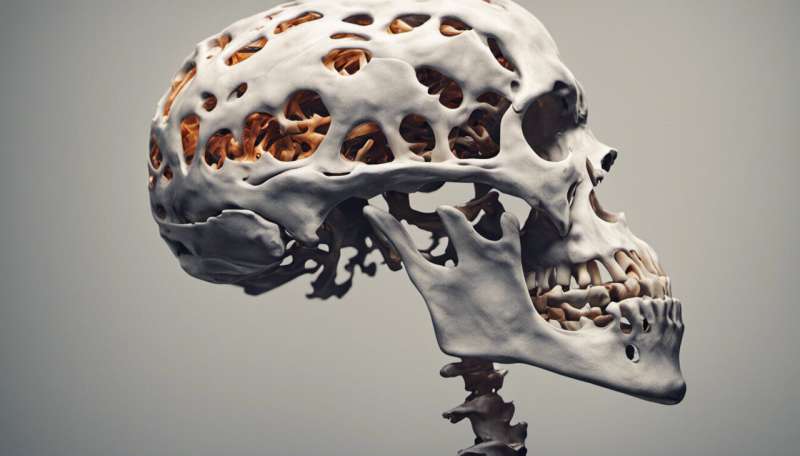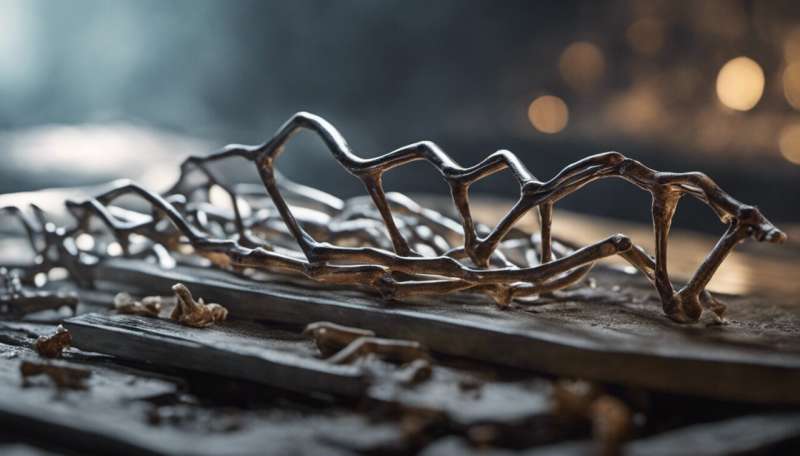This article has been reviewed according to Science X's editorial process and policies. Editors have highlighted the following attributes while ensuring the content's credibility:
fact-checked
trusted source
written by researcher(s)
proofread
Bones play an important role in our health—here's how to keep them strong

Just as our muscles lose strength as we get older, so do our bones. This can have a serious effect on our lifestyle, and boosts risk of fractures—which are linked with an increased risk of death. Fortunately, just as we can build the strength in our muscles, we can build strength in our bones.
Bones are far more than a simple scaffold within our bodies. Bone is a complex organ which comes in a multitude of shapes and sizes. It's made up of a diverse mixture of organic and inorganic components—such as collagen and calcium. Combined together, these components create a structure that's malleable enough that muscle can pull against it so we can move, while simultaneously being strong enough to protect critical organs.
Bone is not the solid, immovable, permanent structure that many might assume it to be. Healthy, living bone remains strong because it's constantly being turned over, with old and damaged bone being excavated out and replaced with fresh bone.
This internal quality control sees our skeleton being replaced approximately every ten years in healthy people—though this is slower in people who are older or sick. Certain health conditions can also cause excessive bone loss—such as cancer and hormonal changes during the menopause.
Unlike many other tissues, such as cartilage, tendon and muscle—where only a small number of different cell types occur—bone is comprised of a multitude of different cells. These include bone cells, immune cells, fat cells, nerve cells and blood cells, to name a few.
The combined action of these cell types help our body maintain adequate bone volume throughout life, so we can continue to be active.
Specialized bone cells (called osteoblasts and osteoclasts) help modify our bones to repair damage and increase volume depending on the demands placed on them. So a tennis player who repeatedly serves with the same arm will have higher bone volume in their serving arm as a result.

Looking after your bones
Maintaining your bones throughout life is essential for good health and well-being. A sudden loss in mobility as a result of fracture has considerable knock-on effects to lifestyle—where walking around the shops, visiting friends and performing even the smallest daily tasks around the house can be painful.
Bone density (strength) can be preserved no matter your age with good diet and exercise.
A balanced diet rich in calcium (a crucial mineral within your bone) is recommended. Aim to consume 700mg a day. Milk, yogurt and cheese are all great sources of calcium. If you're vegan, foods such as tofu, beans and lentils all contain calcium. You may need to take a supplement if you aren't able to get the recommended amount of calcium in your diet.
Importantly, our bodies need vitamin D to fully absorb calcium, so spending time outside is key as our skin makes vitamin D when exposed to the sun. Try to get up to ten minutes twice a day. In the winter, when there tends to be less sunlight, you may want to consider a vitamin D supplement.
Exercise is another way you can keep bones strong—specifically weight-bearing exercises. Walking and climbing the stairs are great options to begin with if you don't regularly exercise. But more rigorous activities—such as jumping rope or weight training—are better, as they stimulate more bone growth. This is because when the muscles pull hard on the attached bone, it stimulates growth.
These kinds of exercises can be done by anyone of any age. Just be sure to adapt the exercise you do to your fitness level and ability. It's also recommended you gradually build up the amount you exercise to avoid injury.
Reducing pollutants in your body (such as smoking and alcohol) will also help give your bone cells the best chance of working properly throughout life.
If you're concerned about how strong your bones are—or if you have certain health conditions that may decrease your bone mineral density (such as coeliac disease, inflammatory bowel disease, diabetes and cancer)—you can always speak to your GP about your concerns. They will be able to give you personalized advice on the best ways of looking after your bones.
This article is republished from The Conversation under a Creative Commons license. Read the original article.![]()




















